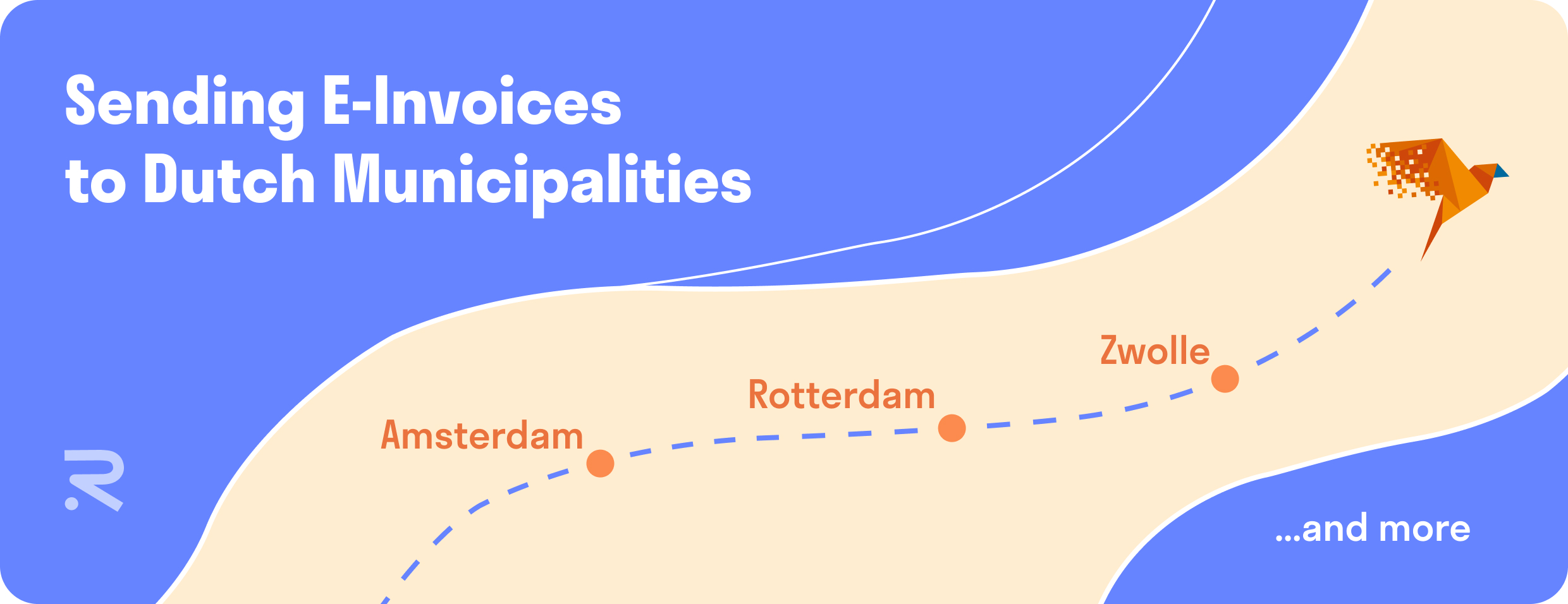
As an entrepreneur, you have plenty on your plate.
That’s why we support entrepreneurs with practical tools and partnerships that help future-proof your business.
One of our trusted partners is Billit. Their e-invoicing solution makes it easy to remain compliant with current and future invoicing standards.
We’ve partnered with Billit to create a simple guide for first-time e-invoicing to Dutch municipalities, featuring examples from major cities like Amsterdam, Rotterdam, and Zwolle to show how they approach e-invoicing. The best part? Billit makes e-invoicing easy and fast.
If you provide products or services to the Dutch government, you're required to send a digital invoice. This also applies to invoices for municipalities, provinces, and Dutch water authorities.
A digital invoice—also known as an e-invoice—contains special codes that allow the recipient to process the data automatically. It includes the same details as a regular invoice but is formatted as an XML file, without any visual layout.
A common misconception is that a PDF counts as an e-invoice. While a PDF is digital, it can't be processed automatically, so it doesn't qualify as an e-invoice.
Right now (2025), e-invoicing is only required for B2G transactions in the Netherlands. The Dutch government adopted e-invoicing early, in 2017, to serve as an example for other sectors.
B2B e-invoicing may not be mandatory yet, but it’s already possible—and many businesses have started using it to streamline their invoicing. That's why Billit encourages entrepreneurs to take advantage and stay ahead of upcoming regulations.
In Belgium, e-invoicing for B2B will be mandatory starting January 1, 2026. If you do business with Belgian companies, it’s smart to switch now and be prepared in time.
E-invoicing helps prevent VAT fraud and simplifies tax processes. It leads to faster payments, fewer errors, less admin, and lower costs—benefiting both governments and businesses.
Most e-invoicing runs through Peppol, a secure international network managed by OpenPeppol. Because e-invoices can’t be intercepted, Peppol significantly reduces the risk of invoice fraud.
Peppol is a secure network for sending and receiving e-invoices. It makes invoicing faster, safer, and more efficient than traditional methods.
Peppol is the international standard for e-invoicing—and the required method for invoicing Dutch government bodies, including municipalities.
To use Peppol, you need access via your accounting software, a service provider or invoice portal, which ensures your invoices are safely delivered through the network.
Sending a digital invoice to a Dutch municipality for the first time? Municipalities understand that entrepreneurs need clear guidance and support. Below, we highlight how three cities—Amsterdam, Rotterdam, and Zwolle—handle e-invoicing.
There are two ways to send an electronic invoice (e-invoice) to the City of Amsterdam:
1. Via the Peppol network
If your accounting software supports Peppol or you’re connected through a service provider with an invoice portal (like Billit), you can send e-invoices directly. You’re free to choose your own service provider.
2. Via Amsterdam’s e-invoicing portal
If you don’t have a Peppol connection, you can manually create and send e-invoices using Amsterdam’s free e-invoicing portal. More details are available in their quick start guide.
Registration and a test process are required for both methods. Visit the City of Amsterdam’s e-invoicing page for more information.
There are several ways to send an electronic invoice to the City of Rotterdam:
1. Via the Peppol network
If your accounting software supports Peppol, you can send e-invoices directly.
2. Via email
If your software doesn’t support Peppol, you can email your e-invoice (XML file along with a PDF version) to the City of Rotterdam.
3. Via a free invoice portal from a service provider
If you send fewer than 25 invoices per year, you can use the invoice portal from any service provider for free. With Billit, you can send unlimited invoices through their free portal. Simply create an account, log in, generate your e-invoice, and send it to the City of Rotterdam.
If you send more than 25 invoices per year, you can contact Rotterdam’s onboarding team for more efficient e-invoicing options. They’re happy to provide guidance and support.
For more information, visit the City of Rotterdam’s e-invoicing page.
There are three ways to send an e-invoice to the City of Zwolle:
1. Via the Zwolle e-invoicing portal
If you send invoices occasionally or don’t use accounting software, you can use Zwolle’s e-invoicing portal. Simply log in, create an invoice, and send it securely to the City of Zwolle.
2. Via the Peppol network
If your accounting software supports Peppol, you can send e-invoices directly. If you’re not yet connected to Peppol, you can reach out to a service provider like Billit to get connected.
3. From PDF to Peppol invoice
Can’t connect to Peppol directly? Any service provider can help convert your PDF invoice into a compliant e-invoice, so you can still meet the legal requirements.
You’ll need to register with the City of Zwolle before sending e-invoices. After registration, you’ll receive an activation code and further instructions. For more information, visit the City of Zwolle’s e-invoicing page. There you’ll also find the specific invoice requirements set by the municipality.
E-invoicing is becoming increasingly important, not just for government invoices, but soon also for B2B transactions. The European Commission aims to make e-invoicing mandatory across Europe. Starting in 2028, e-invoicing is expected to become the standard, even for business-to-business (B2B) transactions.
Whether you're invoicing Amsterdam, Rotterdam, Zwolle, or another municipality, Peppol ensures your invoices are processed quickly and securely.
By adopting e-invoicing now, you’ll meet today’s requirements and be fully prepared for what’s coming.
Curious? Try Billit for free or get in touch to find out more!